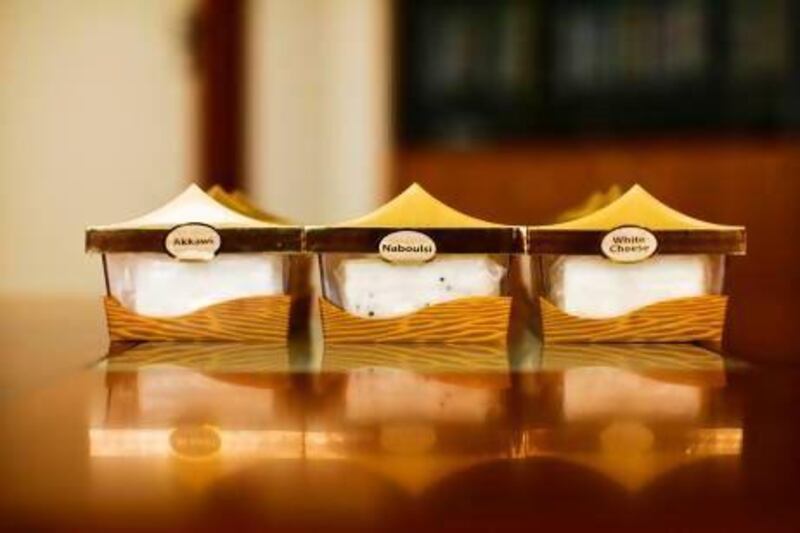DUBAI // The UAE's first commercial batch of camel-milk cheese is expected to hit supermarket shelves as early as next week.
After a year of test production, White Gold cheese will be sold in supermarkets including Geant, Hyper Panda, Abu Dhabi Co-operative, Union Co-operative and Sharjah Co-operative in Abu Dhabi, Dubai and Sharjah.
"Finding the right design and packaging took time," said Muhammad Ashraf, assistant sales manager at Camelicious, which makes the cheese.
There are three varieties: Nabulsi, with small black caraway seeds; Akkawi, a soft, unripened white cheese with a smooth texture and a mild salty taste; and traditional white cheese, which resembles cottage cheese and has a mild to sharp taste. The latter is cured and stored in its own salty whey or water brine.
"It is processed in many degrees of firmness, ranging from soft and crumbly to fairly hard," said Benjamin Gnanaraj, quality controller at Camelicious.
All three types are intended for use in salads, sandwiches and cooking. The cheese, which has a two-week shelf life, has a fat content of nine grams per 100g - far lower than many other cheeses, which typically contain between 25g and 35g of fat per 100g.
About 10 per cent of the 5,000 to 6,000 litres of milk produced each day by the farm's 3,000 camels is being used for cheese.
"Every day we produce 30 to 40 kilograms of cheese," Mr Ashraf said. "Some of it goes to taste trials, some to royal palaces and some to hotels and cafes for chefs to sample it in recipes and learn how to use it, because they're not used to this kind of cheese."
Because camel milk contains less than 10 per cent of solids, its yield of cheese is low. "From 12 litres of milk, we can produce one kilogram of cheese," he said. "The fat content is very low and that's what is used to make the cheese."
The low yield makes the cheese expensive, costing from Dh39 for a 200g, tent-shaped pack.
Since last week the cheese has been available at Camelicious's Majlis Cafe in the Dubai Mall. It is expected to be on sale in supermarkets within the next 10 days.
The company is also preparing to export the cheese. "The demand from GCC countries is high," Mr Ashraf said. "People are becoming more aware of its health benefits, so we're now working on the export packaging."
The farm is in the process of increasing its herd. Every month, it receives at least 200 camels from Saudi Arabia, Sudan, Yemen, Pakistan, Oman and the UAE.
"Increasing milk production is not that easy because we're playing with nature," he said. "Some camels can give 20 litres a day but others only two."
The average is about seven litres, up from five just a few years ago.
"It will take us time but we aim to reach 12 litres," Mr Ashraf said. "But it will be highly beneficial for people who can't consume cow's milk."
Camelicious also plans on producing labneh, a soft cheese made from dried yogurt, white butter, ghee and other types of cheese using camel milk in the future.






